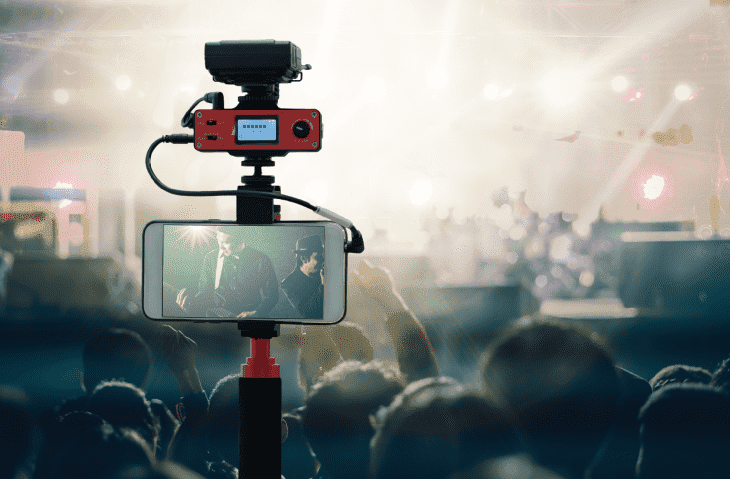The event ticketing market has been on the mend from COVID-19 effects, and is also seeing higher adoption rates of mobile ticket purchasing via ticketing apps. For selling tickets, most online ticketing providers are combining primary and secondary ticketing marketplaces as this increases the inventory and ticket prices.
Since the shift to digital, event organizers and ticket vendors are facing many unique and somewhat interconnected issues. These obstacles to growth include lost revenue from tickets being resold by secondary sites and scalpers, patrons using fake mobile tickets to attend events bought from these sites, and fans lacking access to buying tickets, as they are unethically sold out online in a matter of seconds.
A popular idea proposed to tackle some of these problems is the use of Blockchain and NFTs. While they may have the capability to solve modern problems, are they actually the best solution?
In this article, we will focus on three distinctive problems that the industry and our clients are currently facing. For each of these problems, we will propose two potential solutions - one fueled by Blockchain and NFTs, and the other based on the latest technologies.
What Is Blockchain?
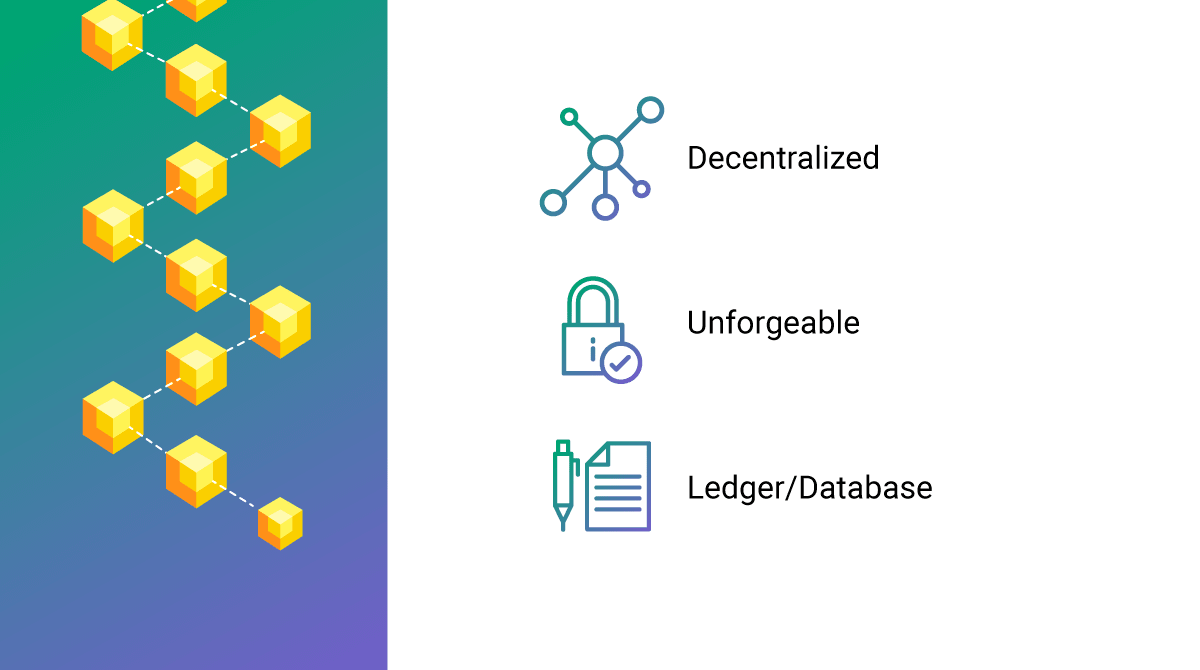
Blockchain can be used in many different industries including ticketing.
Originally, blockchain was introduced as a concept of decentralized and immutable database- software that runs on interconnected and self-regulated machines around the world.
Without a centralized server, all nodes in the network agree on using the same rules. The data is stored in the form of a ledger where it is never deleted or updated.
If there is a need for changes, a new record is created to describe the change. Blockchain can be public or private, or somewhere in the middle, depending on the blockchain access permissions.
What Are NFTs?
Non-Fungible Tokens (NFTs) provide a way to record information about a unique digital asset in the blockchain, so it is possible to have ownership of that asset and trade it similarly to other cryptocurrencies. Blockchain is used to keep track of the ownership of this asset, and it stores a link to the actual file.
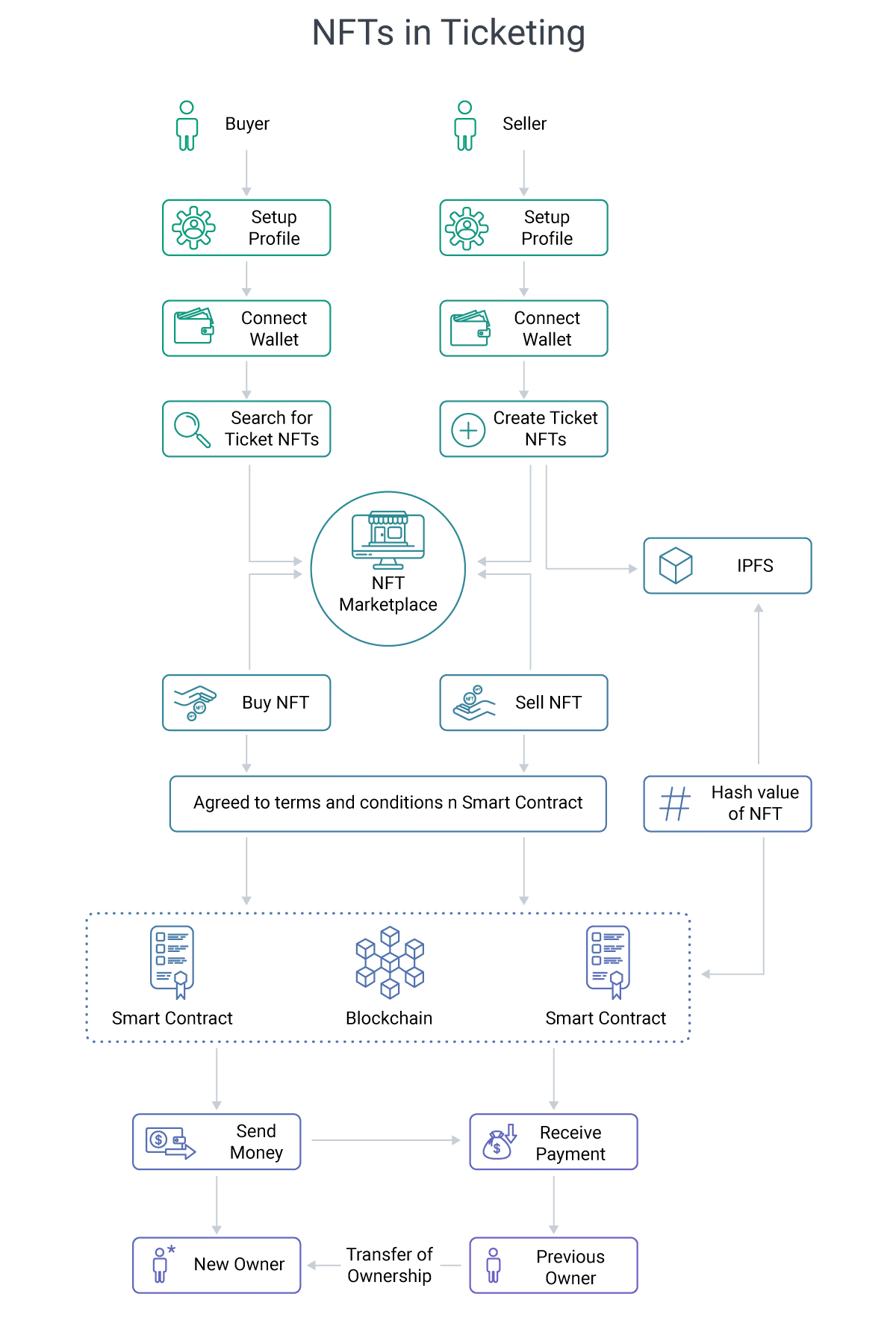
In ticketing, each unique seat for a reserved seating event has its own, different value similar to non-fungible tokens, and event organizers can mint only a certain amount of NFT tickets on their preferred blockchain platform. NFTs can be coded with a set price, so when a buyer books and pays for an NFT-based ticket, the smart contract would trigger the transaction and send the ticket to the buyer.
The Latest & Most Frequent Problems in the Ticketing Industry

Creating more transparent pricing in ticketing will benefit both patrons and event organizers.
The ticketing industry is plagued by fraudulent activities that force fans to pay a high price for tickets on the secondary market. Ticketing bots often cause chaos as they enable online resellers to purchase all available tickets in minutes, and often become the only source of tickets for fans.
Another big problem in the ticketing industry stems from the exchange of ticket data outside of big platforms, which leaves space for deceptive behavior. When tickets are resold, organizers are left without information about the ticket owners, and cannot control how many times one ticket can change hands.
Counterfeit tickets are a major concern for event organizers. It has become increasingly frequent for patrons to come to events with fake tickets they bought from websites claiming to be authorized resellers, just to be turned down at the door. This not only leads to revenue loss but also causes discontent for fans who try to go to an event they had been waiting for just to find out their tickets are counterfeit.
Problem 1 - Patrons attend events with fake tickets bought on secondary sites
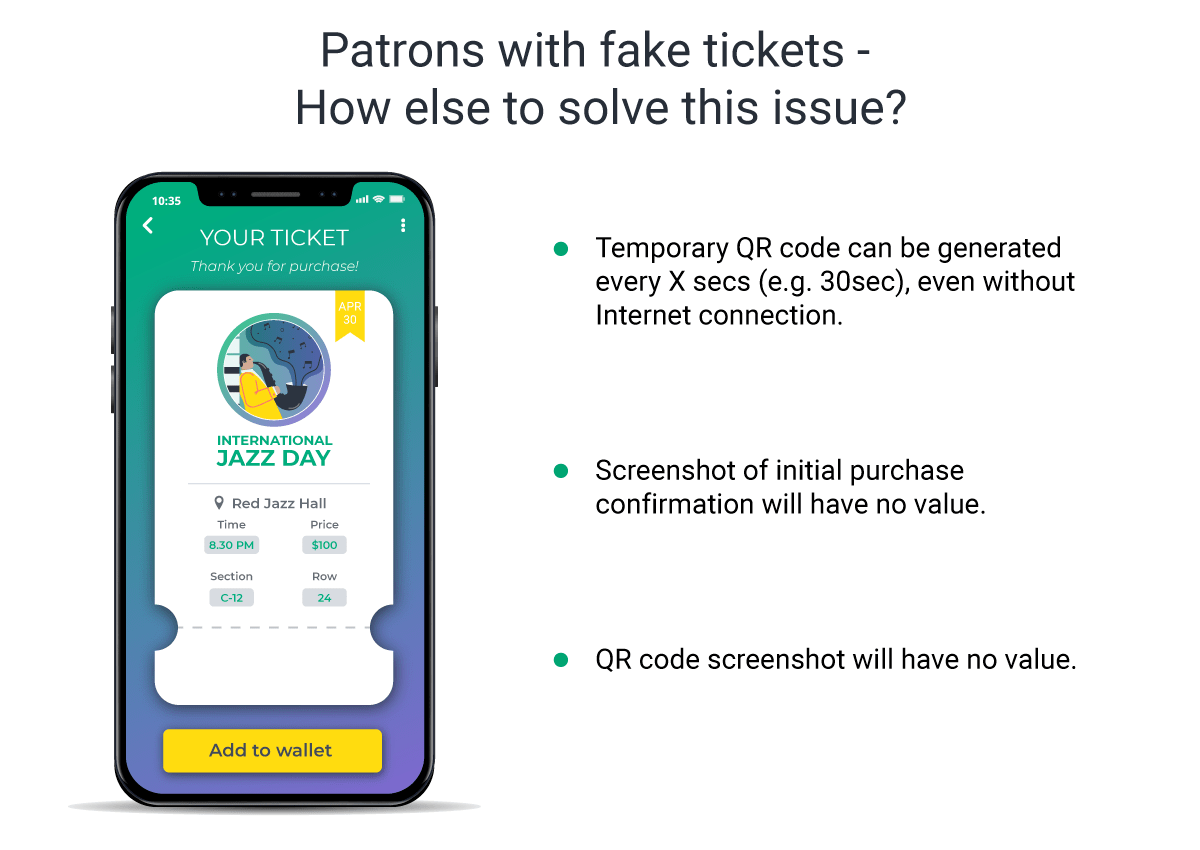
Many issues regarding fake tickets can be solved using digital ticketing.
Digital Ticketing to the Rescue!
When tickets only exist in a digital format, stealing them is not so simple. With nothing material to steal there’s no possibility for anyone to copy them other than by taking a screenshot of the QR code.
If a ticketing service switches to digital-only ticketing they can utilize dynamic QR codes and NFC for access control. That way, patrons can’t sell tickets on the secondary market as they don’t have the access to the code until right before the event.
Can NFTs/Blockchain Help?
Blockchain is not bulletproof against fraudulent behavior, especially on the new blockchains where there are higher chances that an attack might happen. While blockchain can use similar technology to digital ticketing to reduce fraud, it does not offer any exceptionally unique solution.
Like digital ticketing, the way to solve the counterfeit ticket problem with NFTs is for tickets to be issued in digital forms, so patrons can see their tickets only in a special mobile app that would validate their ownership. Dynamic or rotated QR codes would be generated shortly before the event starts and would be visible only to the end ticket holders. If the ticket stays in the system, it is harder for it to end up in the hands of scalpers.
Problem 2 - Performers lose out on revenue when tickets to their shows are resold

Digital ticketing offers solutions to increase control over ticketing sales and resale processes.
NFTs Give More Control Over Ticket Resale & Revenue
When it comes to the age-old issue of ticket reselling, NFTs can be your best asset to stay in control. This is because NFT tickets can be used as collectible and tradable digital assets. Doing this allows patrons to record the ownership of their tickets in blockchain and trade them online.
For unique festivals, exhibitions, and events, creating tradeable merchandise as NFTs often means higher value and increased interest. Coachella festival decided to offer its fans lifetime passes with their new Coachella Collectible NFTs. The festival partnered with a cryptocurrency exchange, FTX, for this project, and they have built their marketplace on the Solana blockchain.
Another way artists and organizers can use NFT to add unique value to their events is to create additional video or audio content that appeals to consumers. It's possible to offer exclusive backstage video content, footage, or anything related to the event.
Another benefit of using blockchain is that you can better control ticket prices and create a royalty payment system so artists won’t lose out on much money due to scalpers.
Problem 3 - Fans don’t have access to their tickets
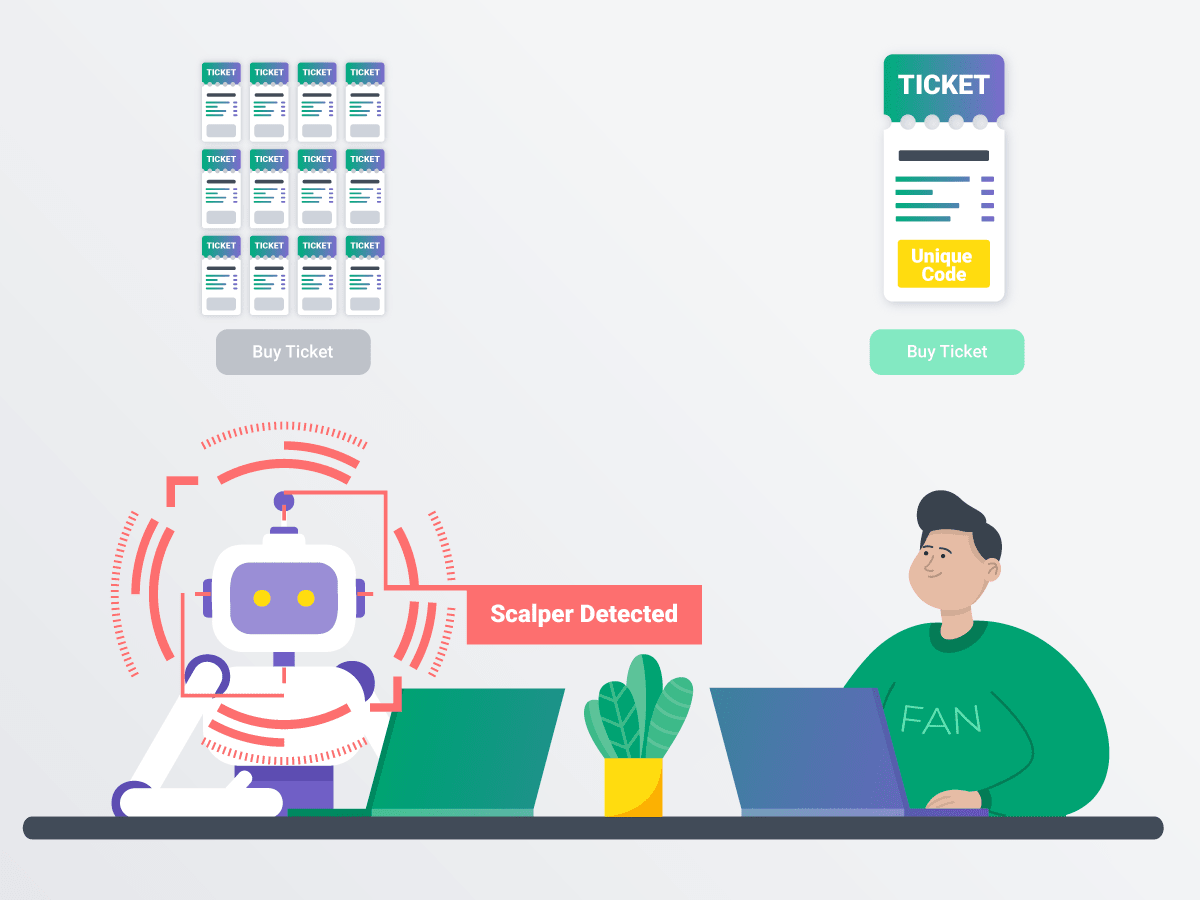
Allowing more fans to safely purchase tickets is one of the major benefits of digital ticketing.
Digital Tickets are the Answer!
Digital ticketing platforms and access control apps can help fans get access to tickets with less chance of fraud. If you are issuing digital tickets, regardless of the coding language or database, there are possibilities to create a code that can control resale.
Ticketing Platform API resolves potential resale issues with digital-only tickets. Reselling functionality can be a part of the platform and be fully connected to third-party secondary services. This can solve instances where consumers’ tickets are fraudulently used.
Digital ticketing allows:
- Tickets to be delivered to the customer’s digital wallet within their mobile app
- The ticketing system to record the new ticket owner in their database
- Ownership changes to be more easily traced in any existing database group
One solution that the ticketing platform can employ is issuing tickets directly to buyers with limited access codes. When patrons have one-time access codes, they will receive their tickets right before the event in time to show them at the entrance. This way, event organizers can prevent potential fraud and assure buyers that their tickets will work on the event day.
Can NFTs/Blockchain Help?
When issuing NFT tickets, there are technologies and processes that can be applied to help patrons avoid losing access to their purchased tickets. Using blockchain in ticketing systems enables event organizers to keep track of the tickets after they are sold. However, it is not really necessary to use NFT or blockchain technology in order to solve ticket access issues.
What You Should Know Before Using Blockchain/NFTs:
Costs
With blockchain, every transaction comes with a fee. Ethereum's transaction price grew significantly from April 2019/2020, when it was $0.10 for an “average” transaction, to January 2022, when it was somewhere between $33 and $52.
Speed and Reliability
Processing speeds depend on the cost as new blockchains are promoting themselves as the cheapest options, but their prices are on the rise in the long run. When those processors crash and there’s no support available, users are left with no one to help them resolve issues.
Alternatively, private blockchains, like Ripple and Hyperledger, are faster than public ones since they have fewer users, so they take less time to reach a consensus and validate transactions.
Privacy
Data put on the blockchain cannot be removed, and if it's on a public blockchain, anyone can have access to it. Public or permissionless blockchains are anonymous, and everyone in the network can access the chain and add blocks.
While public blockchains do offer transparency and security, they are not heralded for their privacy. There are ways to protect this data, but encrypting it might create a whole new set of problems.
Sustainability
Blockchain technology can have a significant impact on the environment. Thousands of machines have to work non-stop to enable transactions every day, using incredible amounts of electricity.
Final Thoughts
New technologies respond to and provide potential solutions to current problems occurring in ticketing. The live event industry is fast-paced, and ticketing companies are looking for new opportunities and technologies that will help them create better event experiences and greater ticket security.
Key takeaways:
- Ticketing providers do not need to wait for NFT technology to offer a secure service - there are already existing solutions.
- Ticketing platforms can satisfy many of the claims promised by blockchain and NFTs using digital ticketing.
- NFTs shine most when it comes to creating revenue opportunities for performers.
NFT and blockchain technology are idealized by many industries - including ticketing - because of their promise to increase transparency and safety. This technology can be used to solve many problems, particularly giving organizers more control over the ticket reselling process.
However, preventing fraud is still possible without blockchain, and there are actually more effective fraud-fighting solutions using other types of ticketing systems.
When deciding whether to start using blockchain in ticketing, keep in mind that there’s no one-size-fits-all solution. It's crucial to keep an open mind and fully understand the problems of your ticketing system before deciding to work with blockchain.
At Softjourn, our goal is to find a long-term solution, not necessarily a trendy one, and offer our clients solutions that will contribute to their success. If you are ready to talk about using blockchain or digital ticketing solutions, we are here to help guide you to the best option tailored to the issues you are experiencing.





